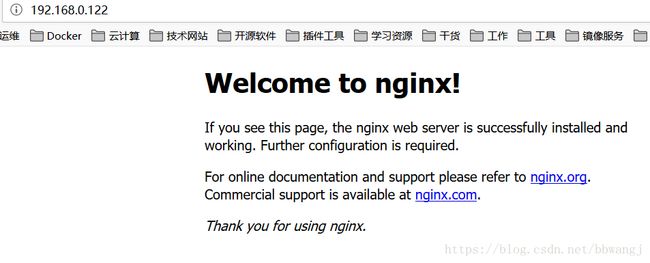Centos7下Nginx编译安装与脚本安装的记录
一、安装工具及依赖
yum install -y wget make cmake gcc gcc-c++ \
yum install -y pcre pcre-devel lib zlib-devel && \
openssl openssl-devel
二、下载及解压nginx
wget http://nginx.org/download/nginx-1.12.2.tar.gz && \
tar -xzvf nginx-1.12.2.tar.gz && rm -f nginx-1.12.2.tar.gz && cd nginx-1.12.2
[root@localhost nginx-1.12.2]# pwd
/usr/local/nginx-1.12.2
三、编译安装
./configure --prefix=/usr/local/nginx --with-http_ssl_module --with-http_realip_module --http-client-body-temp-path=/usr/local/var/tmp/nginx/client
--http-proxy-temp-path=/usr/local/var/tmp/nginx/proxy
--http-fastcgi-temp-path=/usr/local/var/tmp/nginx/fcgi
--http-scgi-temp-path=/usr/local/var/tmp/nginx/scgi
--http-uwsgi-temp-path=/usr/local/var/tmp/nginx/uwsgi
--with-http_geoip_module
--with-http_stub_status_module/usr/local/var/tmp/nginx/proxy
--http-fastcgi-temp-path=/usr/local/var/tmp/nginx/fcgi
--http-scgi-temp-path=/usr/local/var/tmp/nginx/scgi
--http-uwsgi-temp-path=/usr/local/var/tmp/nginx/uwsgi
--with-http_geoip_module
--with-http_stub_status_module
make && make install
四.检查安装
启动Nginx,启动完之后检查nginx是否已经正常启动
[root@localhost nginx-1.12.2]# /usr/local/nginx/sbin/nginx
[root@localhost nginx-1.12.2]# ps -ef |grep nginx
root 12563 1 0 14:44 ? 00:00:00 nginx: master process /usr/local/nginx/sbin/nginx
nobody 12564 12563 0 14:44 ? 00:00:00 nginx: worker process
root 12568 3627 0 14:45 pts/1 00:00:00 grep --color=auto nginx
五、nginx常用命令
/usr/local/nginx/sbin/nginx -s start 启动nginx
/usr/local/nginx/sbin/nginx -s stop 关闭nginx
/usr/local/nginx/sbin/nginx -s reload 重启nginx
六、配置防火墙
[root@localhost nginx-1.12.2]# firewall-cmd --zone=public --add-port=80/tcp --permanent
success
[root@localhost nginx-1.12.2]# firewall-cmd --reload
success
七、测试nginx访问
通过浏览器访问nginx欢迎页,在地址栏输入:http://192.1680.122,如下图所示。
八、配置nginx
nginx最重要的配置文件nginx.conf
[root@localhost nginx-1.12.2]# vi /usr/local/nginx/conf/nginx.conf
#user nobody;
#开启进程数 <=cpu数
worker_processes 1;
#错误日志保存位置
#error_log logs/error.log;
#error_log logs/error.log notice;
#error_log logs/error.log info;
#进程号保存文件
#pid logs/nginx.pid;
#每个进程最大连接数(最大连接=连接数x进程数)每个worker允许同时产生多少个链接,默认1024
events {
worker_connections 1024;
}
http {
#文件扩展名与文件类型映射表
include mime.types;
#默认文件类型
default_type application/octet-stream;
#日志文件输出格式 这个位置相于全局设置
#log_format main '$remote_addr - $remote_user [$time_local] "$request" '
# '$status $body_bytes_sent "$http_referer" '
# '"$http_user_agent" "$http_x_forwarded_for"';
#请求日志保存位置
#access_log logs/access.log main;
#打开发送文件
sendfile on;
#tcp_nopush on;
#keepalive_timeout 0;
#连接超时时间
keepalive_timeout 65;
#打开gzip压缩
#gzip on;
server {
#监听端口
listen 80;
#监听域名
server_name localhost;
#charset koi8-r;
#nginx访问日志放在logs/host.access.log下,并且使用main格式(还可以自定义格式)
#access_log logs/host.access.log main;
#如果没有location更明确的匹配访问路径的话,访问请求都会被该location处理
location / {
#root指定nginx的根目录为/usr/local/nginx/html
root html;
#默认访问文件,欢迎页先去html目录下找index.html,如果找不到再去找index.htm
index index.html index.htm;
}
#error_page 404 /404.html;
# redirect server error pages to the static page /50x.html
#
#错误页面及其返回地址,错误码为500、502、503、504都会返回50.html错误页面。
error_page 500 502 503 504 /50x.html;
location = /50x.html {
root html;
}
# proxy the PHP scripts to Apache listening on 127.0.0.1:80
#
#location ~ \.php$ {
# proxy_pass http://127.0.0.1;
#}
# pass the PHP scripts to FastCGI server listening on 127.0.0.1:9000
#
#location ~ \.php$ {
# root html;
# fastcgi_pass 127.0.0.1:9000;
# fastcgi_index index.php;
# fastcgi_param SCRIPT_FILENAME /scripts$fastcgi_script_name;
# include fastcgi_params;
#}
# deny access to .htaccess files, if Apache's document root
# concurs with nginx's one
#
#location ~ /\.ht {
# deny all;
#}
}
# another virtual host using mix of IP-, name-, and port-based configuration
#
#server {
# listen 8000;
# listen somename:8080;
# server_name somename alias another.alias;
# location / {
# root html;
# index index.html index.htm;
# }
#}
# HTTPS server
#
#server {
# listen 443 ssl;
# server_name localhost;
# ssl_certificate cert.pem;
# ssl_certificate_key cert.key;
# ssl_session_cache shared:SSL:1m;
# ssl_session_timeout 5m;
# ssl_ciphers HIGH:!aNULL:!MD5;
# ssl_prefer_server_ciphers on;
# location / {
# root html;
# index index.html index.htm;
# }
#}
}配置文件里可以添加多个server,server监听的端口不同,可以根据需要让nginx代理多个端口,每个端口指定去做某些事情。
9、脚本安装nginx
#!/usr/bin/env bash
echo -e '\e[31mInstallation tools and dependencies\e[0m'
yum install -y wget make cmake gcc gcc-c++
yum install -y pcre-devel lib zlib-devel openssl openssl-devel
if [ $? -eq 0 ];then
echo -e '\e[32mSuccessful!\e[0m'
else
echo -e '\e[31mFailed\e[0m'
exit 0
fi
echo -e '\e[31mInstallation nginx\e[0m'
wget http://nginx.org/download/nginx-1.12.2.tar.gz \
tar -xzvf nginx-1.12.2.tar.gz && rm -f nginx-1.12.2.tar.gz && cd nginx-1.12.2 \
./configure --prefix=/usr/local/nginx \
make && make install
if [ $? -eq 0 ];then
echo -e '\e[32mSuccessful!\e[0m'
else
echo -e '\e[31mFailed\e[0m'
exit 0
fi
echo -e '\e[31mStart nginx\e[0m'
/usr/local/nginx/sbin/nginx
echo -e '\e[32mSuccessful!\e[0m'亲测成功!主要防火墙开放80端口!
9、创建nginx启动命令脚本
vi /etc/init.d/nginx
#! /bin/bash
# chkconfig: - 85 15
PATH=/usr/local/nginx
DESC="nginx daemon"
NAME=nginx
DAEMON=$PATH/sbin/$NAME
CONFIGFILE=$PATH/conf/$NAME.conf
PIDFILE=$PATH/logs/$NAME.pid
SCRIPTNAME=/etc/init.d/$NAME
set -e
[ -x "$DAEMON" ] || exit 0
do_start() {
$DAEMON -c $CONFIGFILE || echo -n "nginx already running"
}
do_stop() {
$DAEMON -s stop || echo -n "nginx not running"
}
do_reload() {
$DAEMON -s reload || echo -n "nginx can't reload"
}
case "$1" in
start)
echo -n "Starting $DESC: $NAME"
do_start
echo "."
;;
stop)
echo -n "Stopping $DESC: $NAME"
do_stop
echo "."
;;
reload|graceful)
echo -n "Reloading $DESC configuration..."
do_reload
echo "."
;;
restart)
echo -n "Restarting $DESC: $NAME"
do_stop
do_start
echo "."
;;
*)
echo "Usage: $SCRIPTNAME {start|stop|reload|restart}" >&2
exit 3
;;
esac
exit 0chmod a+x /etc/init.d/nginx #设置执行权限
chkconfig --add nginx #注册成服务
chkconfig nginx on #设置开机启动
#启动nginx服务
service nginx start
#停止nginx服务
service nginx stop
#重启nginx服务
service nginx restart
#重新读取nginx配置(这个最常用, 不用停止nginx服务就能使修改的配置生效)
service nginx reload
